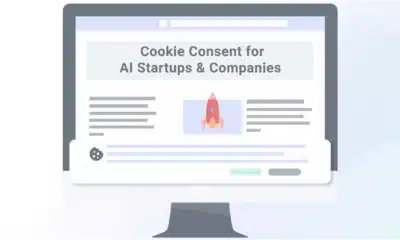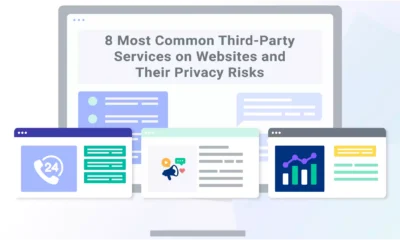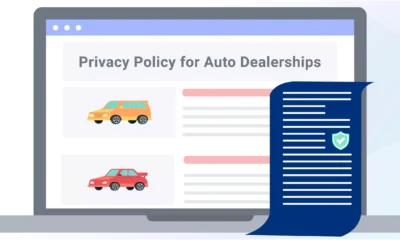Data privacy compliance can be intimidating for businesses, but I’m here to help clear up the confusion surrounding this essential topic.
In this guide, I explain what data privacy compliance is and why it’s important, we hear from two industry leaders about how businesses can benefit from privacy best practices, and present you with reliable solutions to help you achieve it.
What Is Data Privacy Compliance?
A business follows data privacy rules when it properly protects and handles people’s personal information as required by law, and this is known as data privacy compliance.
According to Thales, more than 120 countries have data protection laws of some form meant to provide better protection for their citizens’ personal information.
These laws describe how businesses can collect, process, and use personal data and give consumers more rights and control over their information.
They also outline data protection and security expectations and describe the penalties and consequences of noncompliance.
Why Data Privacy Compliance Is Important
Data privacy compliance is important for businesses because it’s legally required and your consumers expect it.
It’s also necessary for ensuring sustainable future technological developments.
Legal Compliance
Data privacy compliance is legally required by different laws that impact businesses worldwide.
For example, the following sample of privacy laws all require privacy policies and consent management practices:
- General Data Protection Regulation (GDPR)
- Australia Privacy Act 1988
- Brazil’s General Data Protection Law (LGPD)
- California Consumer Privacy Act (CCPA)
- New Zealand Privacy Act 2020
- South Africa’s Protection of Personal Information Act (POPIA)
- Thailand’s Personal Data Protection Act (PDPA)
Your Consumers Care
If you collect personal data but don’t have a privacy or cookie policy on your site, you risk pushing consumers away.
81% of users believe the way a company treats their personal data indicates how it views them as a customer (Cisco); this hurts your brand reputation because consumers might believe you’re an insecure or dishonest website.
According to Phil Pearce, the Founder, CEO, and Analytics Director of MeasureMinds, “When you, as a business, go against the majority and put an emphasis on data privacy, you are building trust and a great brand reputation.”
He adds, “It’s a competitive differentiator.”
According to a 2024 survey conducted by Termly, 91.1.% of businesses are willing to prioritize data privacy if they knew it would increase customer trust and loyalty.
According to these data privacy statistics I gathered from research studies across the Internet, this is the case:
- 92% of Americans are concerned about their privacy when using the Internet. (TrustArc)
- 68% of consumers are concerned about the amount of data businesses collect. (KPMG)
- 60% of consumers believe companies routinely misuse their personal data. (KPMG)
- 76% of Internet users believe companies must do more to protect their data online (Global Consumer State of Mind Report 2021)
- Only 5% of consumers have no major concerns over how organizations use their data. (MAGNA/Ketch)
These consumers may end their relationship with your business if they feel they cannot trust you with their personal information.
In fact, according to the same Cisco study referenced above, 37% of users have terminated relationships with companies over data. This number increased from 34% just two years ago.
Pearce succinctly summarizes how businesses can build this trust: “The more you disclose as a company about how you process user data and the more effort you put into protecting people’s rights, the better your brand is perceived.”
Sustainable Future Technological Developments
For technology like AI and smart devices that rely on the Internet of Things to continue to expand and evolve, we need to ensure that the personal data it collects, uses, and depends on is adequately protected from unauthorized and illegal access.
Data privacy compliance helps encourage and foster a market culture where data protection is considered throughout the entire development of future technologies.
Otherwise, data ends up in the hands of bad actors, which puts consumers and our businesses at risk of cyberattacks and other nefarious crimes.
60% of breaches in organizations led to increased prices passed on to customers. (IBM)
If there’s one thing consumers don’t like, it’s being charged higher prices due to the negligence of a business, especially when their personal data is likely to be involved in the crime, and they’re also victims.
But for businesses, increasing costs might be unavoidable. Here are a few more cybersecurity statistics emphasizing the actual cost of a data breach:
- In 2023, the cost of cybercrime worldwide was estimated to be $8 trillion annually. (Cybersecurity Ventures)
- Data breaches caused by stolen or compromised credentials cost $4.5 million on average. (IBM)
For start-ups and small businesses, a single cyber-attack can lead to their financial demise.
How Businesses Can Achieve Data Privacy Compliance
Businesses can follow these simple tips to achieve privacy compliance.
Sustainable Data Collection
Businesses should only collect data that is absolutely necessary to complete specific purposes.
To achieve privacy compliance, ensure you know why your business collects every piece of data it uses from consumers.
As tempting as it may be, you shouldn’t gather as much information from your customers as possible just to have it.
This is irresponsible data collection and is inadvisable for the following reasons:
- Collecting massive amounts of data puts you at a greater risk of cyberattacks.
- Gathering more information than you need is illegal under several privacy laws.
- Consumers might find your data processing activities to be too invasive.
Data Transparency and Notification
Your business must meet all applicable data transparency and notification requirements outlined by all applicable privacy laws.
Doing so also helps build consumer trust because they’ll know you’re honest about how you collect and use their information.
To achieve data privacy compliance, ensure your business presents users with an accurate, updated privacy policy that’s easy to understand.
Your privacy policy should include the following details:
- What personal data you collect
- Why and how you collect the data
- If you share or sell it to third parties
- Who those third parties are
- What rights your users have over their how
- How they can act on their privacy rights
- Your company contact information
- A last updated date
Consent Management
Businesses that want to be privacy-literate must prioritize consent management. Privacy laws also heavily impact how you track and manage user consent.
For example, you should present your users with a cookie consent banner that links to an accurate cookie policy.
You should also allow them to access a preference center where they can pick and choose which Internet cookies they’re okay with and which ones they want to opt out of having deployed on their browsers.
Under laws like the GDPR, you must obtain user consent before deploying cookies on their browsers.
Businesses can use a Consent Management Platform with a banner, cookie policy, and preference center to achieve data privacy compliance.
Additionally, you can determine which cookies your website uses by running it through a website scanner.
Data Safety and Security
Privacy laws require businesses to keep the personal data they collect safe from unauthorized access, breaches, and other cybercrimes.
To achieve privacy compliance, implement adequate security techniques based on the type of and amount of data your business collects.
Here’s what Heather Benwell, Chief Marketing Officer for ChallengeWord, says about this topic, “As the CMO of a cybersecurity company, I know firsthand the value of data privacy.”
“In just the past couple of years, with the increase in ransomware attacks and AI deepfakes, businesses need to maintain a high level of security on all fronts.”
She adds, “Social engineering has become particularly more sophisticated and is, hands down, the easiest way to break into an organization. Strict security policies, regular testing, and a multifaceted security arsenal are vitally important in the current threat landscape.”
“It only takes one breach to send your reputation into the toilet.” – Heather Benwell, CMO, ChallengeWord
Benwell says, “Businesses need to be wary of these breaches not just for the initial effect of the hack or ransom but the damage these attacks have on the overall brand for years after.” It’s up to your business how you keep this data safe, but some common methods include:
- Limiting who has access to the data
- Using password-protected logins with multi-factor authentication
- Encrypting the data
Organizations can also explore platforms like Centraleyes that help operationalize risk and compliance controls across data privacy and security frameworks.
Ongoing Training
Businesses should prioritize training their team about best practices for data privacy.
Everyone must get trained because human error accounts for 95% of cybersecurity breaches, according to WeForum.
Ensuring everyone on your team knows cybersecurity basics, like recognizing a phishing email or insecure links and setting up strong passwords, helps minimize your chances of falling victim to a data breach.
The training should be ongoing to help your team keep up with the newest security risks and other relevant trends in the industry.
Some easy methods you can implement to help train your team include:
- Signing up for cybersecurity training from a third-party vendor
- Accessing free learning platforms online
- Webinars or video lessons
- Reputable in-person or online courses
- Host presentations led by cybersecurity experts
Achieving Data Privacy Compliance With Termly
Businesses can use Termly’s suite of solutions to easily achieve data privacy compliance — think of us as your one-stop shop for all your privacy needs.
For example, Termly’s Privacy Policy Generator meets the transparency and notification requirements of over 25 different privacy laws worldwide.
It also helps businesses meet the criteria outlined by third-party service providers, like Google Analytics, Amazon Web Services, and others.
Our generator asks simple questions about your business and its data processing activities, then makes a unique policy based on your answers. You can then update your policy as needed directly in your Termly dashboard.
Termly also provides a Consent Management Platform (CMP) that can help you track and log your users’ consent preferences in accordance with privacy laws in over 80 regions.
It features a cookie banner that links to a cookie policy, which can be updated automatically whenever you perform a site scan if you use our cookie audit tool. It even has regional consent settings and adapts based on the location of your users.
It comes with a free DSAR form that you can embed on your website, allowing users to easily submit requests to follow through on their privacy rights efficiently.
Summary
Businesses that want to stay competitive and relevant must prioritize data privacy compliance, especially in our digital world.
Some data privacy best practices are now required by privacy laws, but implementing these solutions also helps you build and maintain consumer trust.
Achieving data privacy compliance also helps ensure our future technological advancements that rely on personal data stay safe and sustainable.
To become a privacy-literate website, you need an up-to-date privacy policy that is easy for users to find, read, and understand.
You also need to use a CMP that tracks and monitors your users’ consent preferences and gives them a choice over when and how you use Internet cookies.
Do all this and more and become a data privacy-compliant company signing up for Termly.
Reviewed by Masha Komnenic CIPP/E, CIPM, CIPT, FIP Director of Global Privacy













